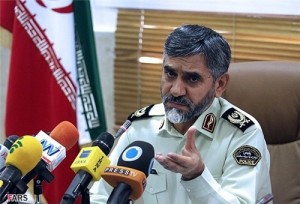 TEHRAN (FNA)- Iran and Afghanistan have had good cooperation in their joint combat against drug trafficking, Commander of the anti-narcotics squad of Iran's Law Enforcement Police General Ali Moayyedi said, adding that Tehran is ready to further strengthen the present trend of cooperation with Kabul.
TEHRAN (FNA)- Iran and Afghanistan have had good cooperation in their joint combat against drug trafficking, Commander of the anti-narcotics squad of Iran's Law Enforcement Police General Ali Moayyedi said, adding that Tehran is ready to further strengthen the present trend of cooperation with Kabul."We have abundant commonalities with Afghanistan and therefore, we should help them succeed in fighting drugs," Moayyedi said in a meeting with Afghan anti-narcotics officials in Tehran on Sunday.
"We are ready to make our utmost efforts to transfer our experiences (in campaign against drugs) to countries like Afghanistan," he added.
Moayyedi underlined that unlike many countries which consider Afghanistan as an accomplice in drug-trafficking to the other parts of the world, Iran views Afghanistan as a victim of drugs which should be saved.
Eastern Iran borders Afghanistan, which is the world's number one opium and drug producer. Iran's geographical position has made the country a favorite transit corridor for drug traffickers who intend to smuggle their cargoes from Afghanistan to drug dealers in Europe.
Iran spends billions of dollars and has lost thousands of its police troops in the war against traffickers. Owing to its rigid efforts, Iran makes 81 percent of the world's total opium seizures and has turned into the leading country in drug campaign.
The Iranian police officials maintain that drug production in Afghanistan has undergone a 40-fold increase since the US-led invasion of the country in 2001.
While Afghanistan produced only 185 tons of opium per year under the Taliban, according to the UN statistics, since the US-led invasion, drug production has surged to 3,400 tons annually. In 2007, the opium trade reached an estimated all-time production high of 8,200 tons.
Afghan and western officials blame Washington and NATO for the change, saying that allies have "overlooked" the drug problem since invading the country 10 years ago.
In relevant remarks in November, Head of Russia's Federal Drug Control Service Viktor Ivanov also blamed the US for a major part of the narcotics smuggled from Afghanistan to his country, saying that the volume of the drug cargos destined for Russia will decrease after the withdrawal of the US forces from the war-stricken country.
"I am convinced that the flow of (Afghan) drugs to Russia will decrease as soon as Americans withdraw from Afghanistan," Ivanov told the Ekho Moskvy radio station.
Ivanov, who had also previously criticized the anti-drug measures taken by the US and NATO forces in Afghanistan, strongly hailed the US withdrawal scheduled for the end of 2014.
He also said that more than 100,000 people aged 15-34 died of drug abuse in Russia in 2011.
Ivanov said earlier that 30 tons of drugs, mostly from Afghanistan in the form of heroin, are trafficked into Russia annually.
By Fars News Agency
The Iran Project is not responsible for the content of quoted articles.










